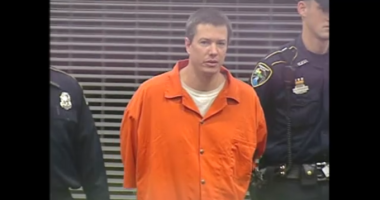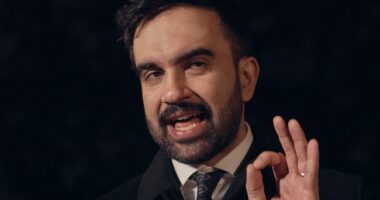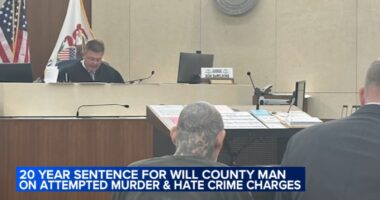Share this @internewscast.com
ERIK and Lyle Menendez may have another shot at freedom even if both of their parole requests get denied.
Erik Menendez, 54, was denied parole on Thursday, while Lyle Menendez, 57, awaits to hear his fate Friday afternoon.
The Menendez brothers have been incarcerated since 1989, following their arrest for the murder of their parents, Kitty and Jose Menendez.
The brothers were convicted of the murders in 1995 and were sentenced to life without parole one year later.
After appealing the case for years, the brothers were re-sentenced to 50 years with the possibility of parole.
The re-sentencing follows decades of protests by the Menendez family to reduce their sentence.
“If they were the Menendez sisters, they would not be in custody,” Anna Maria Baralt, Jose Menendez’s niece, said at a news conference last year.
“We have evolved.”
NEXT STEPS
The California parole board denied Erik’s parole request on August 21, as the board said he would “pose an unreasonable risk to public safety.”
Erik’s wife Tammi, who has publicly defended her husband, said the parole hearing was a “set up.”
“Parole Commissioner Robert Barton had his mind made up to deny Erik parole from the start,” she posted on X after the hearing.
“This was a complete setup, and Erik never stood a chance!”
Even though Erik’s parole was denied, he will have another chance at parole in three years.
However, the brothers’ biggest hope for freedom is a habeas corpus petition they filed in May 2023.
The petition challenges the legality of their imprisonment and seeks a new trial for the case.
The Los Angeles District Attorney’s office opposed the position, but a judge is still evaluating it.
Timeline of the Menendez brothers case

Erik and Lyle Menendez’s case dates back more than three decades since their parents were found shot to death at their Beverly Hills mansion.
Below is a timeline of the brothers’ case, starting at the gruesome crime scene:
August 20, 1989 – José and Kitty Menendez are found dead from multiple shotgun wounds.
March 8, 1990 – Lyle is arrested outside his parents’ Beverly Hills mansion.
March 11, 1990 – Erik surrenders to police after flying back into Los Angeles from Israel.
December 1992 – Murder charges against the brothers are officially filed.
July 20, 1993 – The murder trial, highly publicized on Court TV, begins in Los Angeles with Erik and Lyle each having a separate jury.
January 28, 1994 – The first trial ends with two deadlocked juries.
October 11, 1995 – Lyle and Erik’s second trial begins with one jury.
March 20, 1996 – The Menendez brothers are convicted of two counts of first-degree murder and conspiracy to commit murder.
July 2, 1996 – Lyle and Erik are sentenced to life in prison without the possibility of parole and sent to separate prisons.
February 22, 2018 – Lyle is transferred to the San Diego prison, where Erik is held.
April 4, 2018 – Lyle was moved into the same housing unit as Erik – the first time the brothers were reunited in over 20 years.
May 2023 – Their lawyer submits a habeas corpus petition after allegations of sexual abuse against Jose Menendez by Roy Rosselló, a former member of the Puerto Rican boy band Menudo, surfaced in a Peacock docuseries.
September 19, 2024 – Monsters: The Lyle and Erik Menendez Story releases on Netflix.
October 3, 2024 – Los Angeles District Attorney George Gascón announces that his office is evaluating new evidence related to Lyle and Erik’s convictions.
October 7, 2024 – The Menendez Brothers documentary film comes out on Netflix.
October 16, 2024 – Family members of the Menendez brothers hold a press conference begging for the siblings to be released from prison.
October 24, 2024 – Los Angeles County District Attorney George Gascón recommends the brothers be resentenced.
November 25, 2024 – The brothers attend a court status hearing, where they learn that their resentencing hearing is postponed from December 11 to give new DA Nathan Hochman additional time to examine the case.
January 30-31, 2025 – Erik and Lyle’s resentencing hearing was initially set but had to be rescheduled due to the California wildfires.
February 21, 2025 – Hochman officially opposes a new trial for the brothers.
February 26, 2025 – California Governor Gavin Newsom orders the parole board to conduct a “comprehensive risk assessment” of the Menendez brothers.
March 10, 2025 – Hochman asks the court to withdraw Gascón’s resentencing motion
April 11, 2025 – Los Angeles County Superior Court Judge Michael Jesic denies Hochman’s motion and allows the resentencing process to continue
April 17-18, 2025 – Brothers are scheduled to go before the judge at their resentencing hearings
May 13, 2025 – Menendez brothers sentences reduced to 50 years to life in prison.
August 21, 2025: Erik Menendez denied parole after mammoth 10-hour hearing.
In the meantime, Erik can ask the board to review the case for any factual errors that may have affected his parole request.
Governor Gavin Newsom also has the ability to pardon both Menendez brothers, if he so chooses.
“Newsom can also exercise his clemency power to pardon or release the Menendez brothers at any time,” the DA’s office told ABC affiliate KABC.
Newsom previously commented on the Menendez case back in February during his podcast.
“My office conducts dozens and dozens of these clemency reviews on a consistent basis,” he said.
“This process enhances transparency, which I believe is crucial in this case, and allows for thorough due diligence before any clemency decision,” was stated.
ERIK DENIED PAROLE
Parole Commissioner Robert Barton noted that Erik’s “consistent readiness to engage in criminal activities and break prison rules” was the reason his parole request was rejected.
“I believe in redemption or I wouldn’t be doing this job … but based on the legal standards, we find that you continue to pose an unreasonable risk to public safety,” Parole Commissioner Robert Barton said.
Barton said that Erik has not been a model prisoner, despite the public’s beliefs.
The commissioner cited Erik’s prison violations, which included inappropriate behavior with visitors, drug smuggling, and using a phone in prison.
“The phone, again, in the abstract, it’s easy for the people on the outside to look at that and go, ‘what’s the big deal?'” Barton said.
“[It] doesn’t change the fact that you knew what you were doing and you knew why you were doing it.”
Barton said Erik’s murder of his mother, Kitty, showed he was “devoid of human compassion.”
“I can’t put myself in your place,” he said.
“I don’t know that I’ve ever had rage to that level, ever.
“But that is still concerning, especially since it seems she was also a victim herself of the domestic violence.”
Barton said that Erik could either throw himself a “pity party” or better himself so he may receive parole in the future.





















